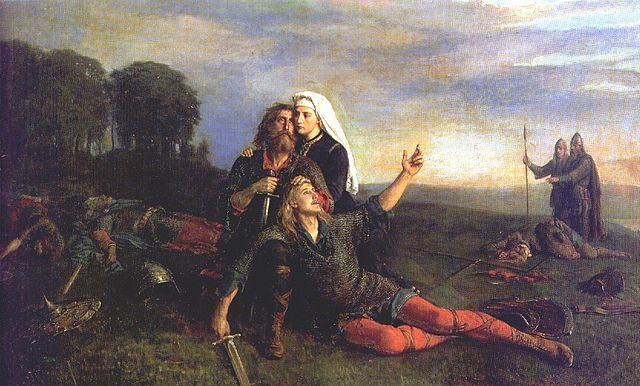Loading AI tools
Genre of Norse saga From Wikipedia, the free encyclopedia
A legendary saga or fornaldarsaga (literally, "story/history of the ancient era") is a Norse saga that, unlike the Icelanders' sagas, takes place before the settlement of Iceland.[1] There are some exceptions, such as Yngvars saga víðförla, which takes place in the 11th century. The sagas were probably all written in Iceland, from about the middle of the 13th century to about 1400, although it is possible that some may be of a later date,[2] such as Hrólfs saga kraka.[3]

In terms of form, fornaldarsögur are similar to various other saga-genres, but tend towards fairly linear, episodic narratives. Like sagas in other genres, many quote verse, but in the fornaldarsögur that verse is almost invariably in the metre of Eddaic verse (unlike the skaldic verse found in most other saga genres).[4] The setting is primarily Scandinavia in the time prior to the settlement of Iceland and the conversion of Scandinavia, but occasionally it moves temporarily to more distant and exotic locations or has its characters encounter Christian cultures (one example of both being Örvar-Odds saga). There are also very often mythological elements, such as dwarves, elves, giants and magic. In centuries past, they were considered to be reliable historic sources by Scandinavian scholars,[1] but since the 19th century, they have been considered to contain very little historic material.[5][6] The present consensus is that, although some of the sagas contain a small core which is not fiction, or are based on historical characters, the primary function of the legendary sagas was entertainment, and the aim of the sagas has not been to present a historically accurate tale.[5] Recently, however, it has been emphasized that the sagas are useful sources for the culture of 13th and 14th century Iceland, "in terms of the light that they can shed on the culture in which they were composed"[6] i.e. Iceland in the later Middle Ages.[5] In the words of Margaret Clunies Ross,
Some of the sagas are based on distant historic characters, and this is evident in cases where there are corroborating sources, such as Ragnars saga loðbrókar, Yngvars saga víðförla and Völsunga saga. In the case of Hervarar saga, it conveys names of historical places in present Ukraine during the period c. 150-450,[8] and the last part of the saga is used as a historic source for Swedish history.[9] Indeed, they often contain very old Germanic matter, such as the Hervarar saga and the Völsunga saga which contains poetry about Sigurd that did not find its way into the Poetic Edda and which would otherwise have been lost (see the Great Lacuna). Other sagas deal with heroes such as Ragnar Lodbrok, Hrólf Kraki and Orvar-Odd.[1] In these respects, then, the fornaldarsögur overlap in genre and occasionally content with the Kings' sagas.

The Fornaldarsagas have great value for legend research, since they contain motifs and complexes of motifs from many types of legend of which there is otherwise no documentation in Scandinavia prior to the mid-19th century. They are also of great value for scholars studying medieval Scandinavian ballads, particularly the Faroese kvæði, which are often based on the same matters. Moreover, they are also very important for the study of Scandinavian and Germanic heroic legends together with Saxo Grammaticus' Gesta Danorum which was based on the same heroic poetry and traditions.[1]
Philologists have generally held the legendary sagas in less esteem, in terms of their literary value, than the Icelanders' sagas. The content is often less realistic, the characters more two-dimensional, and the sagas often borrow themes from each other, and from folk tales.[2][5] In these aspects of style and reception, the fornaldarsögur tend to overlap with the Chivalric sagas, particularly those composed in medieval Iceland.
The legendary sagas have influenced later writers, for instance the Swede Esaias Tegnér, who wrote Frithiof's saga, based on the Friðþjófs saga ins frœkna. One such saga was even forged in the early modern period: Hjalmars och Hramers saga.[10]
For a comprehensive list of the medieval fornaldarsögur, with information about manuscripts, bibliography, etc., see Stories for all time: The Icelandic fornaldarsögur.
Seamless Wikipedia browsing. On steroids.
Every time you click a link to Wikipedia, Wiktionary or Wikiquote in your browser's search results, it will show the modern Wikiwand interface.
Wikiwand extension is a five stars, simple, with minimum permission required to keep your browsing private, safe and transparent.